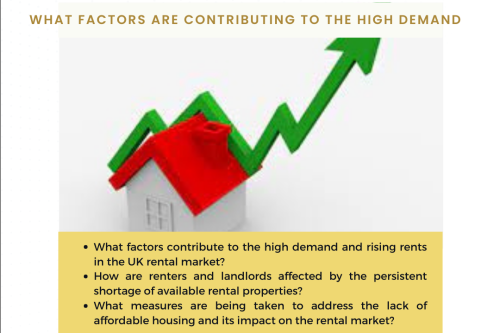- Free Valuation
- Competitive Sales Commission Fees
- Free Mortgage Advice

posted 27th August 2023
The rental market in the UK continues to face high demand and rising rents, with little sign of relief in the near future. Despite a slight cooling in the pace of rental growth, the supply-demand imbalance remains, fueled by economic uncertainty that has led some property owners to return to renting and potential buyers to defer purchases.
In the prime market, average rents have reached £3,813, representing a 10.5% increase year-on-year. While the annual growth rate has slowed slightly, the persistent lack of available properties continues to support high rental prices. Renter demand has increased by 3% compared to June 2022 and is 42% higher than June 2019. Although the gap between supply and demand has closed slightly, with a 7% increase in available properties compared to June last year, it remains 42% below 2019 levels.
One of the contributing factors to the supply shortage is the need for environmental upgrades in the private rented sector. Over half of all rental homes in this sector require upgrading to meet the target Energy Performance Certificate (EPC) rating of C or above by 2028. Additionally, a survey found that 72% of renters consider it important for their buildings to be managed in an environmentally friendly way.
As a result of the scarcity of available properties and rising rents in the open market, renters are opting to stay in their properties for longer durations. The average length of an initial rental contract has increased from 10.5 months in the second quarter of 2019 to 12.7 months in the same period this year. The proposed Renters (Reform) Bill aims to end fixed-term Assured Shorthold Tenancies (ASTs) and introduce open-ended rental contracts, providing greater flexibility for renters. This bill reinforces good practices followed by many investors and helps eliminate rogue landlords while raising standards.
The Office for National Statistics (ONS) has recorded the largest annual increase in rents since it began tracking data eight years ago. Rents paid by tenants in the year up to July 2023 rose by 5.3%, with no signs of a decrease in the near future. Private rentals are in high demand, surpassing the available housing supply. This situation, coupled with rising energy bills and food costs, has made housing costs increasingly burdensome for tenants.
Experts predict that rents will continue to rise due to the ongoing supply issue and rising mortgage rates. The Royal Institution of Chartered Surveyors (RICS) reported an enduring mismatch between demand and supply, with more than half of its respondents reporting an increase in tenant demand and a 6% decrease in the number of landlords offering properties. Landlords may pass on increased mortgage payments through higher rents, and competition for rental homes may intensify as aspiring first-time buyers struggle to afford homeownership.
While some landlords may be exiting the market ahead of incoming rent reforms, reducing the supply further, others continue to take advantage of the high demand and increase rents for existing tenants. The Ministry of Justice has reported a surge in no-fault evictions and rent arrears evictions, exacerbating the challenges faced by low-income tenants.
In conclusion, the UK rental market is experiencing high demand, rising rents, and a shortage of affordable housing. The supply-demand imbalance persists, with economic uncertainty encouraging property owners to return to renting and potential buyers to defer purchases. The shortage of available properties and the need for environmental upgrades further hinder the supply of rental homes. Renters are opting to stay in their properties for longer, and the proposed Renters Reform Bill aims to introduce open-ended rental contracts to increase flexibility. The high rental prices and lack of affordability are causing financial hardship for renters, with rent payments accounting for a significant proportion of their income. Despite reforms to protect renters’ rights, little action has been taken to address the underlying issues driving rising rents. The shortage of affordable housing is primarily responsible for the high rent prices, and the private rental sector has expanded to meet the demand. However, the supply-demand imbalance varies across regions, with London facing a significant reduction in available rental homes. Experts predict that rents will continue to rise, with no immediate relief in sight.






